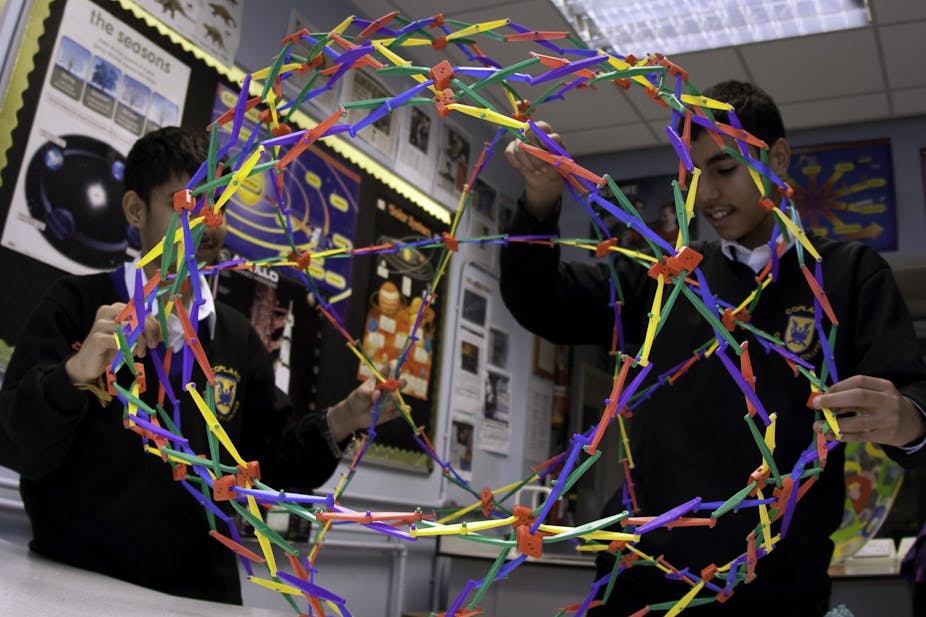Our world is changing at a greater pace than ever witnessed before. Our economies are changing and our understanding of the world around us is changing. Our education systems must also change too because, as they stand, they will not meet the needs of our economy and our culture in 20 years time.
While there are many examples of excellent teaching, the curriculum taught in schools in the UK and the qualifications offered to students are not equipping them to live successfully in the future. We must act now to ensure that our education systems remain innovative and world-leading in the years to come, so that all young people can take advantage of the opportunities that come their way.
That is why I am leading calls to make science and mathematics compulsory up to age 18 as part of a baccalaureate, and to create an independent body – no longer a political football – responsible for overseeing the curriculum.
The Royal Society has published a report that sets out ways to start solving these important issues. As a “vision for science and mathematics education”, it has two goals: to raise the general level of mathematical and scientific knowledge and confidence in the population, and to ensure that education systems link people’s learning and skills to the current and future needs of the economy.
Why science and mathematics education is important
We can only have a democratic society if people are capable of balancing the benefits and risks of new science and are able to reason mathematically.
Science, engineering and technology drive economic growth across the world, and governments of emerging countries increasingly emphasise the teaching and learning of these subjects. Yet employers in the United Kingdom report significant difficulties in recruiting young people with the appropriate mathematical and scientific skills they need.
The roots of scientific and mathematical literacy lie in an excellent science and mathematics education gained early in life. This is why our report addresses specific issues relating to the ongoing and persistent shortages of specialist science and mathematics teachers and the poor progression rates of students to post-16 science and maths across much of the UK.
Studying mathematics and science until 18
Young people are not served well by the narrowing of the current curriculum at 16 and 18. Only a fifth of young people in the UK study mathematics beyond 16 and it has been estimated that at least one in four economically active adults is functionally innumerate.
We need a new approach to science and mathematics education, with all young people studying science and mathematics to the age of 18, alongside the arts and humanities, as part of a new baccalaureate-style framework that provides a broad education.
Of course we are not suggesting all young people study A-levels in chemistry, physics, biology and mathematics. It is important to create new and rigorous post-16 courses and qualifications to engage students who are not specialising in the sciences.
Inspirational science and mathematics teachers must be celebrated. We will need many more of them – and for the status of the profession to be raised – if the reforms we propose are to happen.
A stable curriculum
Teachers need stability so they can concentrate on teaching. Change is important – but education has become a political football with too many reforms taking place – which is often to the detriment of excellent science and mathematics education.
We propose the creation of new, independent expert curriculum bodies in England and Wales and greater support for those in existence in Northern Ireland and Scotland. These bodies would draw on the expertise of those working in the science, mathematics and engineering professions to create dynamic and high quality curricula for the subjects. These should evolve over time but do not require frequent, radical change.
This focus on the expertise of subjects and the involvement of these experts from academia and industry would make these bodies different to any anything which has existed before.
Bringing these ideas to life will, of course, require public and political will and a concerted effort by those people working as science, technology, engineering and mathematics professionals. Without these people, this Vision could not have been developed, and will not be able to be taken forward.
The UK is fortunate that many of these individuals belong to vibrant, strong communities – whether learned societies or professional bodies. These organisations have a strong infrastructure which will be vital in helping establish the new curriculum and assessment arrangements we want. This will also be important in order to create a science and mathematics teaching community which is highly trained, motivated and inspirational. And to assure access to high-quality teacher training and professional development.

